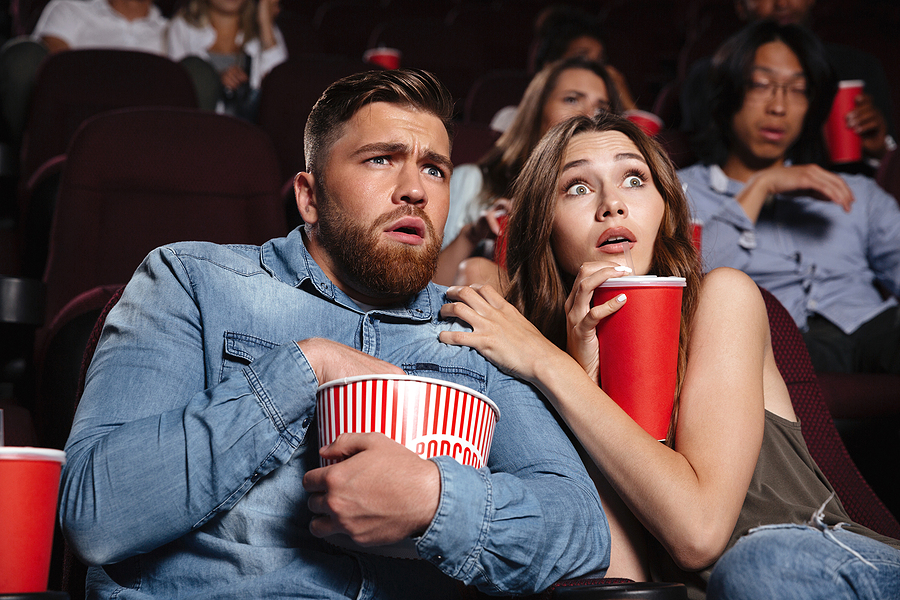- The Impact of Pets on Emotional and Hearing Health - April 26, 2024
- Strategies for Coping with Single-Sided Deafness - April 16, 2024
- Effective Strategies for Sharing Your Hearing Loss Journey - April 16, 2024
The world of cinema is a captivating realm that transports us to different times, places, and emotions. However, amidst the visual spectacle and immersive storytelling, there’s a threat that often goes unnoticed—the potential risk of hearing loss! While going to the movie theater is an experience we all enjoy, the powerful sound effects and intense audio may have implications for our auditory well-being.
Intense Sound Effects
In the pursuit of creating an immersive experience, filmmakers often use intense sound effects, including explosions, gunfire, and roaring engines. These high-decibel sounds can not only startle viewers but also have the potential to cause temporary or even permanent hearing damage.
Dynamic Range
Movies are known for their dynamic range. There is often a huge difference between the softest and loudest sounds. While this dynamic audio is designed to evoke emotions and enhance the viewing experience, sudden shifts from quiet scenes to loud, action-packed sequences can expose the audience to abrupt spikes in sound intensity.
Prolonged Exposure
The duration of movie screenings can contribute to prolonged exposure to loud sounds. Lengthy action sequences or movies with consistently high audio volumes may subject viewers to extended periods of potentially damaging noise levels.
The Theater Experience
Modern theaters boast powerful sound systems that deliver an immersive auditory experience. While this enhances the cinematic experience, the sheer volume produced by these systems can be overwhelming, especially in confined spaces where sound waves reverberate.
Unlike watching movies at home, where viewers have control over the volume, theaters do not provide options for adjusting sound levels. Individuals may be exposed to loud sounds without the ability to regulate the intensity based on their comfort.
The Impact on Hearing Health
Here are three ways that an evening in the theater can impact your hearing:
1. Temporary Hearing Threshold Shift: Exposure to loud sounds, even for a short duration, can lead to a temporary hearing threshold shift. This may cause a temporary reduction in hearing sensitivity, with sounds seeming muffled or less distinct for some time after exposure.
2. Noise-Induced Hearing Loss (NIHL): Prolonged exposure to loud sounds, such as those in cinemas, can contribute to noise-induced hearing loss (NIHL). This type of hearing loss is caused by loud noise. The hair cells in the inner ear can be damaged, and repeated exposure may lead to permanent hearing loss.
3. Tinnitus: The intense and abrupt sounds in movies may contribute to the development or exacerbation of tinnitus—a condition characterized by ringing, buzzing, or humming sounds in the ears. Prolonged exposure to loud noises can trigger or worsen tinnitus symptoms.
Mitigating the Risks
With the right precautions, you can still enjoy watching movies at the theater. Here are a few suggestions:
- Choose the Right Viewing Environment: Opting for screenings in theaters known for their commitment to responsible sound levels can mitigate risks. Some theaters have adopted standards to ensure a more balanced auditory experience.
- Use Ear Protection: Using ear protection, such as earplugs, can help reduce the intensity of sounds and protect against potential hearing damage.
- Adjust Home Viewing Practices: When watching movies at home, consider using closed-captioning instead of raising the volume excessively. This not only helps protect your hearing but also enhances the overall viewing experience.
- Take Breaks During Loud Sequences: During movies with intense sound sequences, consider taking short breaks to allow your ears to recover. This can be especially helpful in reducing the cumulative impact of prolonged exposure to loud audio.
- Raise Awareness: Increasing awareness about the potential risks to hearing health posed by loud movies is essential. Encouraging discussions about responsible sound design and advocating for more awareness in the film industry can contribute to positive changes.
Striking a Balance
While movies offer an unparalleled avenue for storytelling and entertainment, it’s crucial to strike a balance that prioritizes hearing health. Responsible sound design practices, viewer awareness, and proactive measures can help ensure that the cinematic experience remains captivating without compromising our ability to enjoy the sounds of everyday life. As we continue to celebrate the magic of cinema, let’s also champion a culture that values and protects our sense of hearing.
If you think you may have noise-induced hearing loss or you’re curious about your hearing health, visit us for a hearing test.

